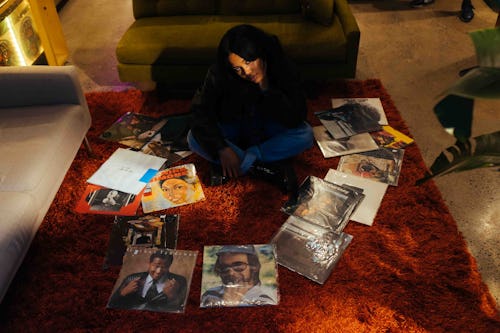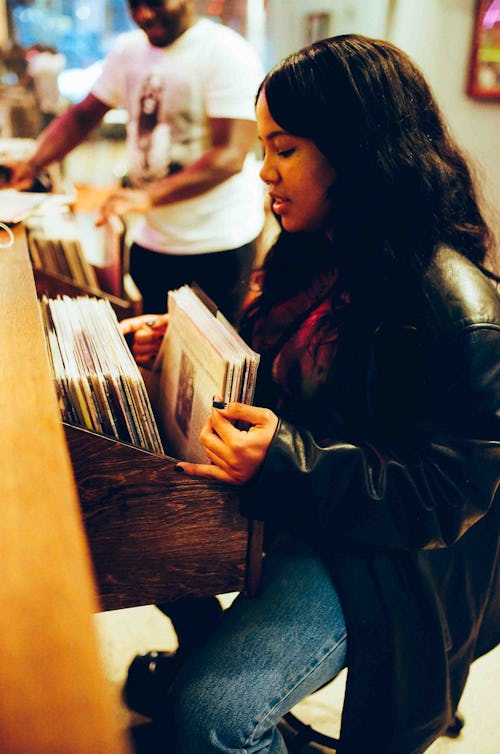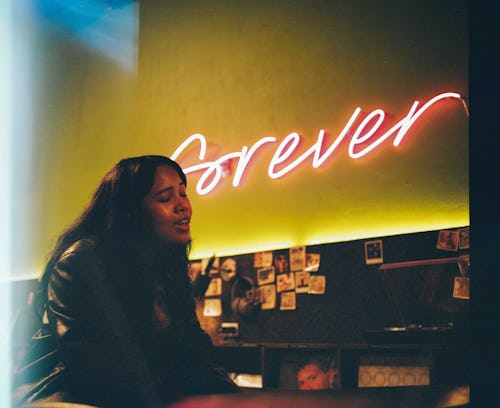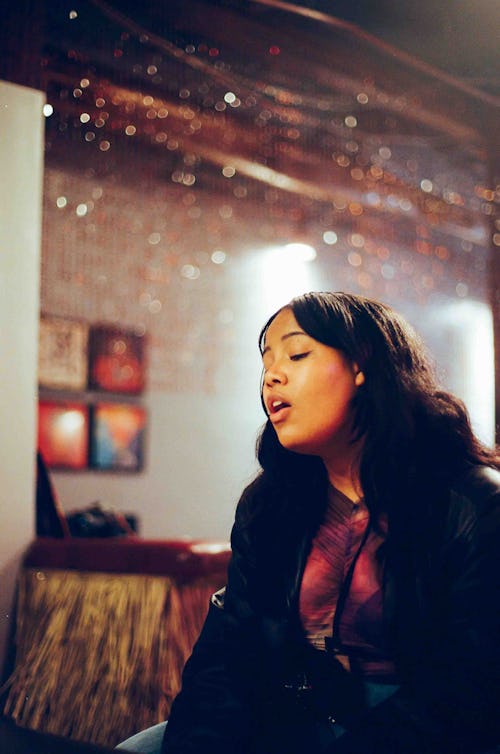
Singing is a superpower when you have a voice like Baby Rose’s.
Born Jasmine Rose Wilson in Washington, D.C., the 27-year old virtuoso artist wields a guttural baritone deep enough to make raw emotions corporeal, like an R&B Wanda Maximoff. The weight of Rose’s voice submerges lyrics like “your waves pull me deep underwater” — a line from the song “Mortal” off her 2019 debut album, To Myself — under bassy tonalities, as if she’s gasping for air with nothing but unrequited love filling her lungs. You could be enjoying a mimosa with the summer sun kissing every inch of your skin, but if you hear Rose’s “sinking 'til I can't reach up” (“Damn”), you’ll be momentarily transported to a time when heartache had you feeling like the only way forward was down.
That’s her superpower. And she knows it.
“My voice is able to hit at certain frequencies. Me using my full voice as a woman, while I’m saying whatever I’m saying, automatically makes it that much more interesting,” Rose tells Mic. “It’s a superpower. It’s a gift. Does that mean I want to go around and say bullshit? Artists like Amy [Winehouse] used their voices to say real shit. As unique as their voices are, the experience is unique.”
When I caught up with Rose in mid-October at Brooklyn-based record shop Legacy, she was days removed from singing on stage with jazz legend Robert Glasper at New York City’s Blue Note Jazz Club and attending a private screening of Questlove’s Summer of Soul documentary. Rose’s voice gained her entrance to those rarified spaces reserved for the music elite; but she nonetheless treated the record store like it was the Louvre, handling each record she pulled with curiosity and care. And even though she has a Grammy-nominated voice that can bend emotions to her will, she was generous with sharing it, often breaking into impromptu performances mid-answer.
While excitedly rifling through records of her idols — pausing at times to expound on Nina Simone’s influence or why Joni Mitchell was “that bitch” — Rose spoke on why she doesn’t let TikTok dictate the music she makes, why she prefers the sound of the past but doesn’t consider herself a retro artist, and how she’s gone from unknown to revered by legends.
Before her voice was superhuman, it was seen as a scarlet letter she brandished with every uttered breath in middle school. “I was looked at like I was a kind of unicorn or some shit at school,” she recalls, “because I was little and niggas kept fucking with me about how I talk.” When high school rolled around, Rose used that same voice to chisel an image of her liking, performing an original song at a talent show that sent shockwaves through the student body. By that point, her peers were finally catching up to the reverence her family had shown her talents for years.
“I remember coming to Washington, D.C. every summer just to hear her play the piano, which her uncle Jacque Wilson bought her, and she was amazing,” Rose’s aunt, Tammy Gandy, tells Mic. “God has blessed her. The name Baby Rose fits her perfectly, because of how she’s blossomed into the rose she is.”

Despite having only released one album so far, Rose has garnered success beyond her years. She scored her first Grammy nomination for singing on “Self Love” from J. Cole and Dreamville’s Revenge of the Dreamers III compilation album. She toured around the country with Ari Lennox on her Shea Butter Baby Tour before headlining her own international tour cut short by the pandemic. She’s covered Nina Simone on stage with Glasper, and performed with The Roots at Irving Plaza. She also just performed at the Day N Vegas music festival. But, to reduce her artistry to a voice that doesn’t sound like anyone else out, would be to overlook the fact her music also doesn’t strive for other artists’ goals, either.
Baby Rose is a farm-to-table artist; she doesn’t pump her music with algorithmic GMOs by packaging her songs as TikTok challenges, as many of her peers do. Her music is ripped straight from her heart through velvety vocal cords, plated on evocative soundscapes with the intention of connection more than consumption. She records anachronistically (“When I’m recording, I love the sound from back then versus the really hi-fidelity [sound of now]”). She is a student of her craft (“I took [an online] course on songwriting from Berklee over the pandemic”). She’s a byproduct of the past and the future; counting her contemporary, Baby Tate, with providing the inspiration to produce her own music while adhering to lessons learned from legends of yesteryear.
“I feel like writers like Joni Mitchell, Nina, and Stevie [Wonder] were very unabashedly themselves,” Rose says. “With the music today, you feel like you’re trying to beat an algorithm, so you may feel more tempted to do things that are hot versus really making your own sound. I’m not going to say everybody is like that. The other side of that is there are people trying to be more unique than ever because they want to stand out.”
So, while many of her peers were quarantining in front of ring lights and trying to chase virality as the world burned from racially-charged protests and a global pandemic; Rose was too spiritually in-tune with the turmoil around her to work on music, let alone a fabricated 15-second slice of her life. “Niggas were hitting me up like, ‘Do TikTok,’ and I’m watching a race war happen, motherfuckers are sick,” she says. “I was like, ‘This is what you want me to do?’’

By most metrics, Rose still hasn’t broken through yet. None of her solo records have charted on Billboard, and her debut album was more of a cult classic than a commercial hit. But even without radio stations playing her songs on repeat, Rose was able to sell 6,000 tickets to her Golden Hour virtual concert last September. She’s confident she can achieve all of her dreams without sacrificing her integrity. “It’s not about the money when you’re asked to do some dumb shit,” she says. “I was turning down ridiculous bags in the process of me getting my deal because they wouldn’t let me have my masters.”
Her debut album, To Myself, was the reflection of a young woman dealing with an emotionally abusive relationship, baring her soul because that’s all she had to give. Her upcoming EP comes from a woman who tasted success without being satiated, is dating without relinquishing her autonomy, and stays hopeful without being delusional. She’s no longer vulnerable because she’s scared. She’s vulnerable because she’s curious, opening up her heart to delve deeper into who she is and become more acquainted with her power. And that superhuman voice is getting her into rooms beyond her wildest imagination.

With unbridled joy filling her cheeks, Rose retold the story of her performance with Glasper at Blue Note on October 4. Her uncle, who gave her her first piano, was in the crowd watching her for his birthday, along with other family members. Rose took time out of her performance to commemorate the moment with a speech about what it meant for them to see her on stage. After her first performance of the night, she headed backstage to decompress from an admittedly emotional set, just as Dave Chappelle popped into the dressing room to offer praise and sage advice. “You did an amazing job. I heard what you said about your uncle. I think that’s beautiful. You have to continue to have that energy. Carry that with you,” Rose remembers Chappelle telling her.
Before she returned to the stage, and after securing her favorite niece spot by getting her uncle a photo with Chappelle, Chris Rock and Chappelle treated everyone in attendance to an impromptu joint standup comedy set. After the show, she tagged along with Glasper and his crew to a grimy basement-style afterparty to celebrate Talib Kweli’s birthday. Still riding high from performing in the presence of legends, she spied out the corner of her eye another who shaped her: Kanye West. “Talib starts playing ‘I Wonder,’ which is one of my favorite ‘Ye songs, I locked eyes with [Kanye] and I swear I’m rapping the first verse and the hook to him! And he’s smiling,” she says. “At that moment I thought, ‘Wow, this is my life.’”
This is the life of R&B’s most down-to-earth superhuman who’d rather be real-life imperfect than TikTok immaculate.
“I don’t want to be perfect. It’s a very unrealistic standard that would make me very unhappy,” Rose says. “That’s not what I’m on. I’m actually not going to do anything I don’t want to do.”







